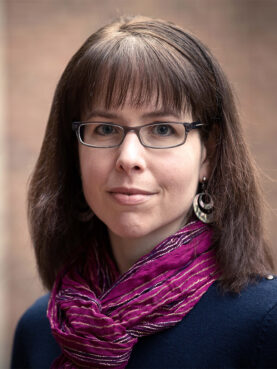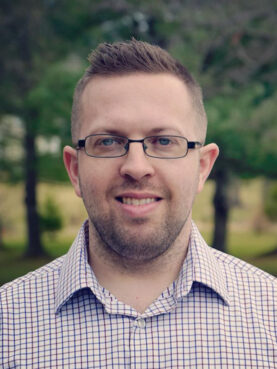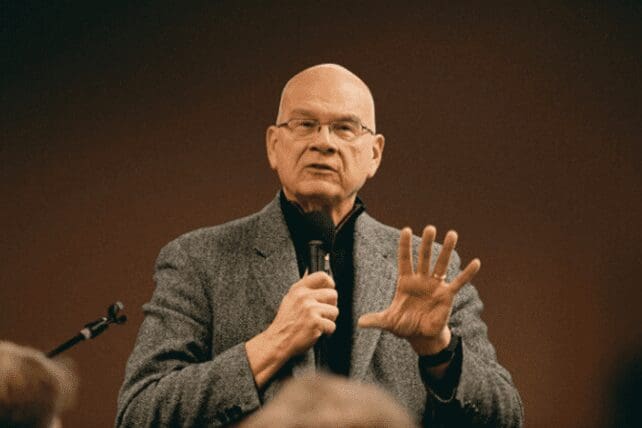That sense of community is typical of evangelical renewal movements, said Du Mez. Baptists, Calvinists and even charismatic Christians saw Reformed theology as a unifying force, regardless of the theological traditions of their denominations.

Molly Worthen. Photo by Jafar Fallahi
Another hallmark of the Reformed resurgence was its development of scores of new congregations and a relentless desire among its adherents to spread the gospel.
Molly Worthen, a religious historian at the University of North Carolina, experienced that relentlessness firsthand while writing last year about the Summit Church, Greear’s North Carolina megachurch. “There are few things that humans find more exciting than feeling like they are part of an unstoppable movement,” Worthen wrote.
Worthen, who credits Greear and Keller for her unexpected conversion to evangelical Christianity last summer, said the two men’s beliefs that ideas matter — and that Christianity had intellectual rigor — helped open the door to that conversion.
She suspects intellectual curiosity plays a role in the influence of the Reformed resurgence movement and The Gospel Coalition. “I think there is a fusion there in The Gospel Coalition — which of course Keller helped to found — that combines emphasis on mission with this intellectual gravity and this commitment to serious conversation about ideas that I think people in general are hungry for,” she said.
Brad Vermurlen, a research associate in the sociology department of the University of Texas and author of “Reformed Resurgence: The New Calvinist Movement and the Battle Over American Evangelicalism,” believes the movement’s influence outpaced its actual numbers. New Calvinists came to “represent the center of influence and excitement within the American evangelical landscape,” he said, but in recent years, the movement has declined in “prominence, excitement and energy.”

Brad Vermurlen. Photo by Doug Morino
While the renewal identified charismatic leaders and gave them platforms, it did not do a good job of mentoring those leaders, said Reynolds. While attending The Journey, an influential Reformed church in St. Louis, he saw the church’s pastor, Darrin Patrick, fired in 2016 for misconduct.
“There wasn’t real mentorship of up-and-coming people,” said Reynolds. “There’s a way in which, if someone said they were called, looked good in skinny jeans and could quote someone who was dead, and pop culture, then you could be a leader.”
Anderson said she regrets the movement wasn’t Calvinist enough. She believes the movement focused mainly on salvation but missed a broader emphasis on common grace and the goodness of God’s creation. Those ideas — that God is at work everywhere and not just among an elect few — matter. For some leaders, she said, that lack of balance led to a certainty of belief that lacked kindness toward anyone who disagreed.
Alsup said pride also become a downfall for some leaders in the Reformed resurgence, who believed their theology was better than other Christians’.
Though Mars Hill members didn’t refer to themselves as “new Calvinists,” according to Alsup, when Mars Hill was at its best, members were comforted by Calvinist doctrines like irresistible grace, God’s sovereignty and the perseverance of the saints, which teach that “once God’s got you, he will keep you,” said Alsup.
But Mars Hill’s foundation began to crack. Driscoll was hit with accusations of plagiarism, profanity, sexual fixation, abuse of power and promoting an aggressive brand of machoism.
While Driscoll’s downfall has been attributed to many factors, Alsup points to an arrogance that she said many church members shared. “We thought we were doing something new for God,” she said. “And we despised the generation that came before us. And the pride was the downfall.”
In the years since Mars Hill imploded, Alsup has found herself at a small, multicultural church plant in the Presbyterian Church in America — “I kept the Reformed, but shook off the young and restless,” she quipped.
Keller, Alsup said, represented the best of the new Calvinist movement. He effectively communicated God’s greatness and grace, exuding kindness while probing constantly with his mind.
“It will be interesting to see, does it survive without someone like Tim?” Alsup said. “Have enough folks learned things from Tim to carry on the mantle of making it not threatening, but beautiful?”
This article originally appeared here.

